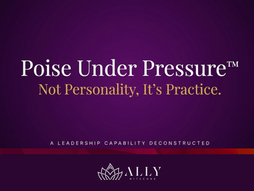Your Workload is Elastic
- Aug 25, 2023
- 3 min read
Updated: Oct 3, 2025
One question I often get asked by emerging leaders and new managers is ‘Will my workload increase?’. With the answer generally assumed to be ‘yes’, the real question I am being asked is ‘How will I cope with my increased workload?’, but what they're saying (very quietly to themselves) is 'Oh My Gosh, this is so much harder than I thought it was going to be'.
When you have newly appointed leaders there’s a misconception that they feel they need to know everything, do everything and be the best at everything… just in case someone comes along and taps them on the shoulder to let them know that, oops, there's been a mistake and they're a big fat fraud! *insert dramatic music
Perhaps you've experienced this imposter syndrome too? I assure you, unless you are a fraud, this won't happen.
There is always a learning curve when stepping into any new role - even if it’s in the same business you’ve been in all of your careers. Employers historically are not great at preparing new and emerging leaders for how their role, and therefore how their workload, will change. People often move into management and leadership roles by dint of their tenure or technical expertise - but the missing piece is the vital people stuff.
In this scenario I like to think of the workload as being elastic - stretching out at times, pinging back into shape at others. Adopting a similarly elastic mindset means new leaders can adapt to workload changes such that at each point in time, the available resources match the current demand as closely as possible. You don’t need to be all things to all people, all of the time - that is a very good way to end up in burnout (do not pass go, do not collect $200).
One of the first steps in embracing an elastic workload is to acknowledge that your role has changed - taking on new responsibilities means letting go of some old ones.
Shifting perceptions
It can be a stark transition - moving from individual contributor to manager. It might involve unlearning some things that are reinforced throughout our careers around personal actions and expertise as we shift into a more holistic way of contributing.
In Becoming A Manager, author Linda Hill asserts that new managers must engage in three fundamental kinds of learning: learning something new, changing one’s mind, and changing oneself. In her research, Hill found that new managers were unnerved and surprised by the unexpected necessity of developing new mindsets, attitudes and values.
In the early stage of your transition, you’ll need to leverage that elastic workload as you learn new skills and establish yourself with your team and peers. Now you’re no longer an active ‘doer’, it’s essential to set boundaries, especially while you develop new dynamics with your former teammates.
Boundaries are powerful for safeguarding your time and attention. They’re not about just saying no to things, they are about creating consistent expectations for those around you and reducing conflict.
With your boundaries in place, you can focus on building a culture of trust in your team through effective communication and clear expectation setting.
The final piece in the puzzle of managing your new, elastic workload, is delegation. Being able to trust and empower your team to take ownership of tasks and projects is one of the hallmarks of successful leadership.
Make it a priority to communicate consistently with your team, check in regularly and offer support when required but do this all in a spirit of self-compassion. You’re a new leader, learning new skills, often on the fly, while delivering results. That’s not easy for anyone.
As you become more comfortable in your new role, you will learn better and quicker ways to do things. Your elastic will stretch. You build relationships that support you and recognise that you are playing to your strengths and helping your team to do likewise.
Give yourself grace in those early days when, in that learning state, your workload will be more. As you stretch into your new role, you’ll see that you were Made for More.
Until next time Eat the Frog, Get the Worm, and Be the Bird.
Ally
Ally Nitschke is a Leadership Expert, Courageous Conversation Specialist and Speaker. She has been working with leaders and as a Leader for over 15 years. She is on a mission to change the way we communicate at work, to lean into those uncomfortable conversations and to lead with courage. Ally delivers Courageous Conversations Programs, Courageous Leadership programs, Coaching, Mentoring and Keynotes. To inquire about her working with you or your organisation please contact us here.










Comments